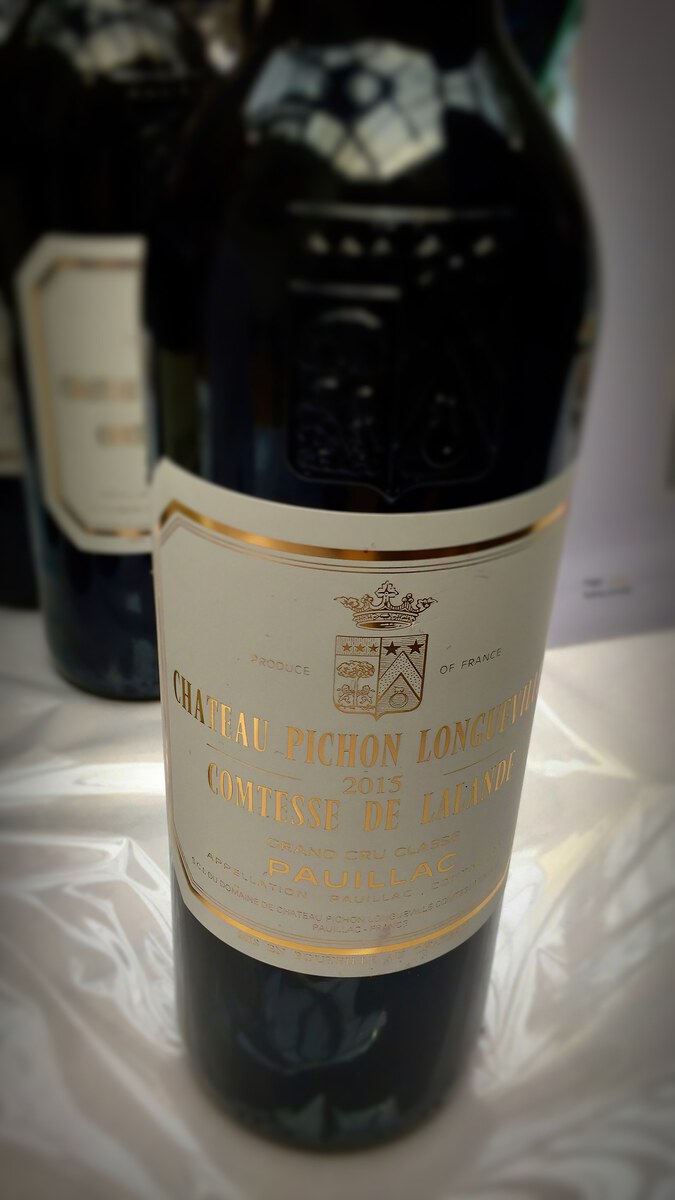Chateau Pichon Langueville "Comptesse De Lalande, Grand Cru Classé" 2015
Blend of Cabernet Sauvignon / Merlot / Cabernet Franc / Petit VerdotComplex and powerful. Cassis, dried lavender, underwood, chocolate.
Tasting Notes
The 2015 Comptesse De Lalande Grand Cru Classé from Chateau Pichon Langueville is an extremely complex bottle with berries and cassis, dried lavender, underwood but also a toasty dark chocolate aroma.
On the palate the 2015 Comptesse De Lalande is chewy with potent tannins and a distinctive freshness that promise great aging potential.
I would love to have another taste in 20 years time.

|
|
Chateau Pichon Langueville |
|
|
Comptesse De Lalande, Grand Cru Classé |
|
|
Red & Still |
|
|
France |
|
|
Pauillac |
|
|
Cabernet Sauvignon, Merlot, Cabernet Franc, Petit Verdot |
|
|
2015 |
|
|
Learn more
Cabernet Sauvignon
Red-wine variety of grape
Cabernet Sauvignon is one of the most well-known red wine grape varieties in the world. It is grown in nearly every major wine-producing region, in a wide range of climates, from the Okanagan Valley in Canada to the Beqaa Valley in Lebanon. Cabernet Sauvignon rose to popularity as a result of its use in Bordeaux wines, where it is often blended with Merlot and Cabernet Franc. The grape spread through Europe and into the New World, settling in places like California’s Santa Cruz Mountains, Paso Robles, Napa Valley, Hawkes Bay, South Africa’s Stellenbosch region, Australia’s Margaret River and Coonawarra valleys, and Chile’s Maipo Valley and Colchagua. It was the world’s most widely planted premium red wine grape for most of the twentieth century, before Merlot overtook it in the 1990s. By 2015, however, Cabernet Sauvignon had reclaimed its place as the most widely planted wine grape, with 341,000 hectares (3,410 km2) under vine globally.
Link to here... | Derived from 'Cabernet Sauvignon' on WikipediaMerlot
Dark blue-colored variety of wine-making grape
Merlot is a dark blue–colored wine grape variety that can be used to produce both blending and varietal wines. Merlot is thought to be a diminutive of merle, the French word for a blackbird, which is most likely a reference to the grape’s color. Merlot is a common grape for blending with the sterner, later-ripening Cabernet Sauvignon, which appears to be higher in tannin, due to its softness and “fleshiness” combined with its earlier ripening.
Link to here... | Derived from 'Merlot' on WikipediaCabernet Franc
Grapevine that yields black grapes used for wine
Cabernet Franc is a popular black grape variety grown all over the world. It’s mostly grown for blending with Cabernet Sauvignon and Merlot in the Bordeaux style, but it can also be vinified on its own, as in Chinon in the Loire. It is also made into ice wine in Canada and the United States, in addition to being used in blends and grown as a varietal.
Link to here... | Derived from 'Cabernet Franc' on WikipediaPetit Verdot
Varietal
Petit Verdot is a red wine grape variety that is mostly used in traditional Bordeaux blends. It ripens much later than the other varieties in Bordeaux, sometimes too late, and as a result, it has fallen out of favor in its native land. When it ripens, it adds tannin, color, and flavor to the blend in small quantities. Petit verdot has gained popularity among New World winemakers, where it ripens more consistently and can be made into single varietal wines. It can also be used to’stiffen’ Cabernet Sauvignon blends’ mid palate.
Link to here... | Derived from 'Petit Verdot' on Wikipedia
